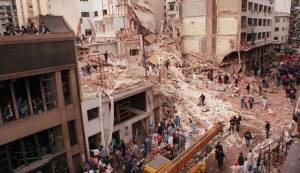An Argentinian prosecutor who proved Iranian and Hezbollah involvement in the 1994 Buenos Aires Jewish center bombing, was found dead shortly before he was scheduled to testify.

Aftermath of the AMIA bombing in Buenos Aires, Argentina (photo credit: La Nación (Argentina)/Wikipedia Commons/File)
Alberto Nisman, the Argentinean state prosecutor who was investigating the 1994 terror attack on the Argentine Israelite Mutual Association (AMIA) Jewish center in Buenos Aires that killed 85 people, and who accused President Cristina Fernandez de Kirchner and Foreign Minister Héctor Timerman of burying an Iranian role in the bombing was found dead in his apartment, local media reported on Monday.
Late Sunday, federal police agents in charge of Nisman’s protection alerted their superiors that he wasn’t answering phone calls, a statement from the Health Ministry reveals. When he didn’t answer the door, they decided to alert family members, the report stated.
When Nisman’s mother wasn’t able to open the door because a key was in the lock on the other side, a locksmith was called to open it, the ministry said. A .22 caliber handgun and a shell casing were found next to Nisman’s body.
Ambito Financiero and other Argentine dailies reported Nisman was found dead in his bathtub with a gunshot wound in the head in his flat in the luxurious Buenos Aires district of Puerto Madero.
“Dr. Nisman has died, we are investigating the cause of the death. In the coming days we will determine the cause of death with an autopsy. We found a weapon,” prosecutor Viviana Fein told journalists who have gathered at the scene.
An Argentinian Coverup with an Iranian Angle
Nisman voiced his accusations against Fernandez just last Wednesday, alleging she had opened a secret back channel to a group of Iranians suspected of planting the bomb.
He said the scheme’s intention was to clear the Iranian suspects so that Argentina could move on with its plan to exchange Argentinean grains for much-needed Iranian oil, news agencies report.
Israel’s Foreign Ministry expressed “deep sorrow” over Nisman’s death. “Nisman, a courageous, venerable jurist who fought intrepidly for justice, acted with determination to expose the identities of the terrorists and their dispatchers,” a ministry statement read.
Lawmaker Patricia Bullrich told television channel TN that members of parliament would meet on Monday morning to discuss the situation.
Nisman was shot just hours before he was due to appear in front of a congressional panel on Monday afternoon to explain his accusations against the president.
A History of Denials and Conspiracies

President Cristina Fernandez de Kirchner. (Photo: wikipedia)
On July 18, 1994, a bomb exploded in front of the AMIA Jewish center, killing 85 people and wounding hundreds more. This was the worst terror attack in Argentine history.
Iran’s specific motivation for the AMIA bombing, according to Nisman, was to punish Argentina for suspending its nuclear cooperation with Iran.
Over the years, the case has been marked by incompetence and accusations of cover-ups. Argentine courts have accused Iran of sponsoring the 1994 bombing, a charge Iran denies.
Since 2006, Argentine courts have demanded the extradition of eight Iranians, including former president Akbar Hashemi Rafsanjani, former defense minister Ahmad Vahidi and Mohsen Rabbani, Iran’s former cultural attaché in Buenos Aires, over their alleged involvement in the bombing.
In 2013, Fernandez tried to form a “truth commission” with Iran to jointly investigate the bombing. She said at the time that the pact would reactivate the probe, but Israel and Jewish groups said the probe actually threatened to thwart a truthful criminal investigation of the case.
The truth commission pact was later struck down by an Argentine court last May, declaring it unconstitutional.
Nisman had said the truth commission was intended to help get Interpol’s arrest warrants dropped against five Iranian suspects as a step toward normalizing bilateral relations.



